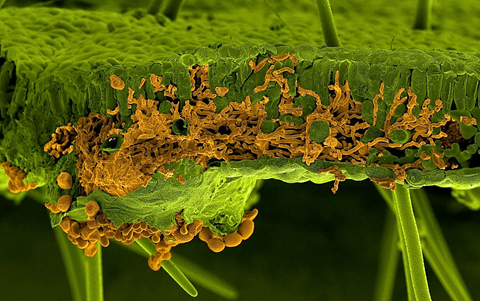International Consortium releases two new genomes of Asian rust fungus
International Consortium releases two new genomes of Asian rust fungus
The international research consortium ASR Genome Consortium, in which the Brazilian Agricultural Research Corporation (Embrapa) takes part, has just publicly released two new reference genomes of the fungus that causes soybean Asian rust (Phakopsora pachyrhizi). The first genome was sequenced, assembled, and made available to the scientific community in 2019. In the occasion, other two genomes obtained by partners were included in the Consortium. With the advance in the data consolidation on the three genomes together, it will be possible to deepen the knowledge on the variability of the fungus and get to know the organization of its genes in many levels, for example, identifying shared and active genes during parasitism, the Embrapa Soybean researcher Francismar C. Marcelino-Guimarães assesses.
"The information obtained from the three reference genomes allows high data reliability, in addition to the immediate possibility of comparative studies in a genomic level," the researcher explains. "The research results will enable a greater comprehension of the action targets of the fungus, in its DNA level, through a chemical product, or even the development of new solutions that work more assertively," Francismar explains.
The reference genomes were collected in South America, a soybean production region affected by the high aggressiveness of soybean rust. "The access to this variability will enable us to expand the comprehension of the high adaptivity and evolution of the fungus, helping to understand the mutations that have happened in different seasons and the resistance process of such fungi to fungicides and also to the resistance genes present in soybeans," Francismar remarks.
International consortium members - The consortium is formed by 12 public and private entities from different locations and it has the premise to make the access to the genome that causes rust public and allow its use for different approaches and future research works. In addition to Embrapa, the consortium also has partners such as Bayer, the 2Blades Foundation, the Sainsbury Laboratory, the German Universities of Hohenheim and RWTH Aachen, the National Institute for Agricultural Research (INRAE-France), as well as the Joint Genome Institute (JGI-USA) of Keygene, Syngenta, and the Federal University of Viçosa (Brazil).
Rust in Brazil - According to data from the Antirust Consortium, the damage provoked by Asian rust reaches US$ 2.8 billion per crop season, which can result in up to 80% of losses in a single crop.
Lebna Landgraf (Mtb 2309 -PR)
Embrapa Soybeans
Press inquiries
soja.imprensa@embrapa.br
Phone number: +55 43 3371-6061
Luís Filipe Escobar, supervised by Mariana Medeiros (Translation - English)
General Secretariat
Further information on the topic
Citizen Attention Service (SAC)
www.embrapa.br/contact-us/sac/

